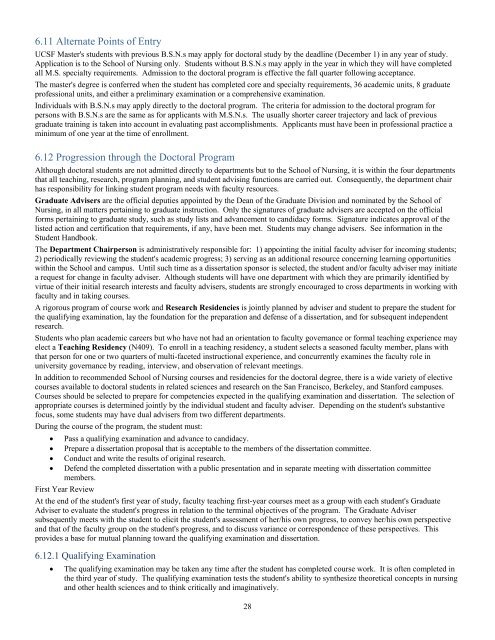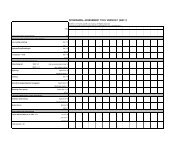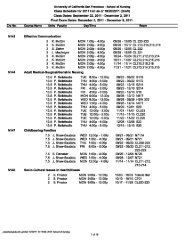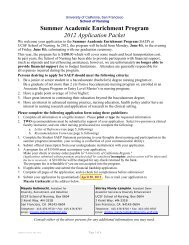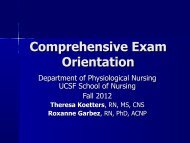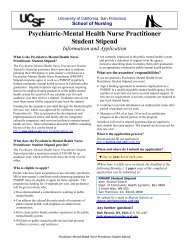1 1. Dean's Welcome - UCSF School of Nursing - University of ...
1 1. Dean's Welcome - UCSF School of Nursing - University of ...
1 1. Dean's Welcome - UCSF School of Nursing - University of ...
You also want an ePaper? Increase the reach of your titles
YUMPU automatically turns print PDFs into web optimized ePapers that Google loves.
6.11 Alternate Points <strong>of</strong> Entry<br />
<strong>UCSF</strong> Master's students with previous B.S.N.s may apply for doctoral study by the deadline (December 1) in any year <strong>of</strong> study.<br />
Application is to the <strong>School</strong> <strong>of</strong> <strong>Nursing</strong> only. Students without B.S.N.s may apply in the year in which they will have completed<br />
all M.S. specialty requirements. Admission to the doctoral program is effective the fall quarter following acceptance.<br />
The master's degree is conferred when the student has completed core and specialty requirements, 36 academic units, 8 graduate<br />
pr<strong>of</strong>essional units, and either a preliminary examination or a comprehensive examination.<br />
Individuals with B.S.N.s may apply directly to the doctoral program. The criteria for admission to the doctoral program for<br />
persons with B.S.N.s are the same as for applicants with M.S.N.s. The usually shorter career trajectory and lack <strong>of</strong> previous<br />
graduate training is taken into account in evaluating past accomplishments. Applicants must have been in pr<strong>of</strong>essional practice a<br />
minimum <strong>of</strong> one year at the time <strong>of</strong> enrollment.<br />
6.12 Progression through the Doctoral Program<br />
Although doctoral students are not admitted directly to departments but to the <strong>School</strong> <strong>of</strong> <strong>Nursing</strong>, it is within the four departments<br />
that all teaching, research, program planning, and student advising functions are carried out. Consequently, the department chair<br />
has responsibility for linking student program needs with faculty resources.<br />
Graduate Advisers are the <strong>of</strong>ficial deputies appointed by the Dean <strong>of</strong> the Graduate Division and nominated by the <strong>School</strong> <strong>of</strong><br />
<strong>Nursing</strong>, in all matters pertaining to graduate instruction. Only the signatures <strong>of</strong> graduate advisers are accepted on the <strong>of</strong>ficial<br />
forms pertaining to graduate study, such as study lists and advancement to candidacy forms. Signature indicates approval <strong>of</strong> the<br />
listed action and certification that requirements, if any, have been met. Students may change advisers. See information in the<br />
Student Handbook.<br />
The Department Chairperson is administratively responsible for: 1) appointing the initial faculty adviser for incoming students;<br />
2) periodically reviewing the student's academic progress; 3) serving as an additional resource concerning learning opportunities<br />
within the <strong>School</strong> and campus. Until such time as a dissertation sponsor is selected, the student and/or faculty adviser may initiate<br />
a request for change in faculty adviser. Although students will have one department with which they are primarily identified by<br />
virtue <strong>of</strong> their initial research interests and faculty advisers, students are strongly encouraged to cross departments in working with<br />
faculty and in taking courses.<br />
A rigorous program <strong>of</strong> course work and Research Residencies is jointly planned by adviser and student to prepare the student for<br />
the qualifying examination, lay the foundation for the preparation and defense <strong>of</strong> a dissertation, and for subsequent independent<br />
research.<br />
Students who plan academic careers but who have not had an orientation to faculty governance or formal teaching experience may<br />
elect a Teaching Residency (N409). To enroll in a teaching residency, a student selects a seasoned faculty member, plans with<br />
that person for one or two quarters <strong>of</strong> multi-faceted instructional experience, and concurrently examines the faculty role in<br />
university governance by reading, interview, and observation <strong>of</strong> relevant meetings.<br />
In addition to recommended <strong>School</strong> <strong>of</strong> <strong>Nursing</strong> courses and residencies for the doctoral degree, there is a wide variety <strong>of</strong> elective<br />
courses available to doctoral students in related sciences and research on the San Francisco, Berkeley, and Stanford campuses.<br />
Courses should be selected to prepare for competencies expected in the qualifying examination and dissertation. The selection <strong>of</strong><br />
appropriate courses is determined jointly by the individual student and faculty adviser. Depending on the student's substantive<br />
focus, some students may have dual advisers from two different departments.<br />
During the course <strong>of</strong> the program, the student must:<br />
<br />
<br />
<br />
<br />
Pass a qualifying examination and advance to candidacy.<br />
Prepare a dissertation proposal that is acceptable to the members <strong>of</strong> the dissertation committee.<br />
Conduct and write the results <strong>of</strong> original research.<br />
Defend the completed dissertation with a public presentation and in separate meeting with dissertation committee<br />
members.<br />
First Year Review<br />
At the end <strong>of</strong> the student's first year <strong>of</strong> study, faculty teaching first-year courses meet as a group with each student's Graduate<br />
Adviser to evaluate the student's progress in relation to the terminal objectives <strong>of</strong> the program. The Graduate Adviser<br />
subsequently meets with the student to elicit the student's assessment <strong>of</strong> her/his own progress, to convey her/his own perspective<br />
and that <strong>of</strong> the faculty group on the student's progress, and to discuss variance or correspondence <strong>of</strong> these perspectives. This<br />
provides a base for mutual planning toward the qualifying examination and dissertation.<br />
6.12.1 Qualifying Examination<br />
The qualifying examination may be taken any time after the student has completed course work. It is <strong>of</strong>ten completed in<br />
the third year <strong>of</strong> study. The qualifying examination tests the student's ability to synthesize theoretical concepts in nursing<br />
and other health sciences and to think critically and imaginatively.<br />
28


